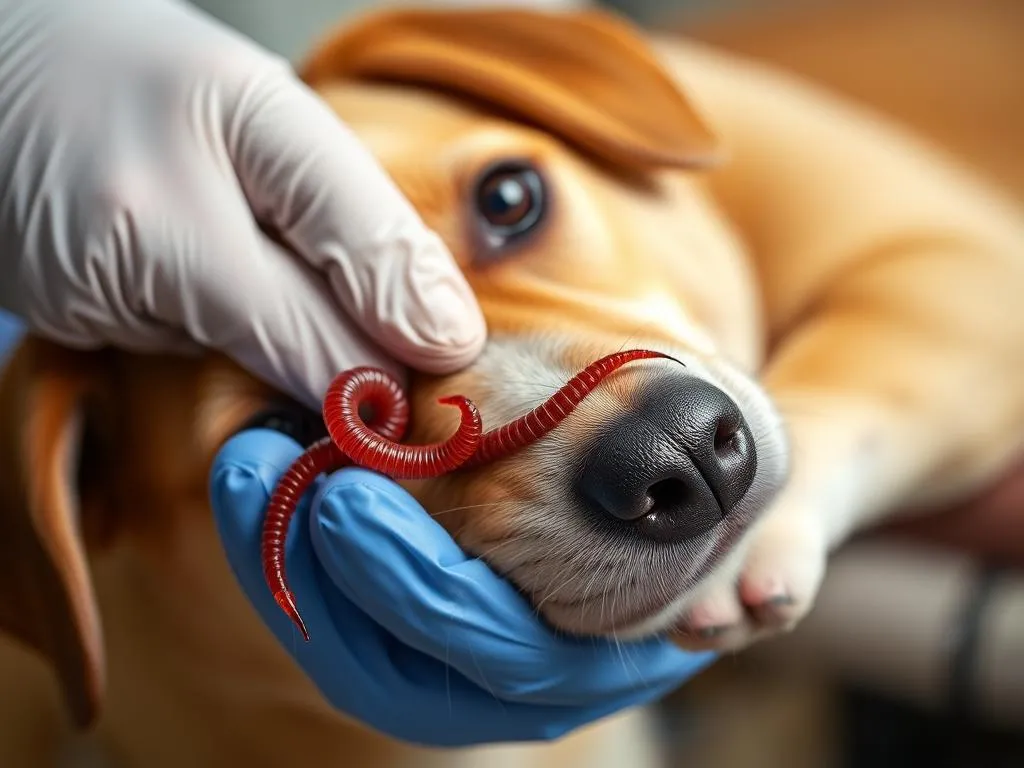
Introduction
Whipworms, scientifically known as Trichuris vulpis, are a type of parasitic worm that can cause significant health issues in dogs. These tiny, whip-shaped worms primarily inhabit the large intestine, leading to a range of gastrointestinal problems. Understanding the impact of whipworms on canine health is crucial for pet owners, as timely diagnosis and treatment can prevent severe complications.
Consulting a veterinarian is essential for an accurate diagnosis and effective treatment plan. In this article, we will delve into comprehensive information about whipworms in dogs, including symptoms, diagnosis, treatment options, and prevention strategies.
Understanding Whipworms
What are Whipworms?
Whipworms are intestinal parasites that primarily infect dogs. They are characterized by their unique shape, resembling a whip, which is how they got their name. Adult whipworms are about 2 to 7 centimeters long and have a narrow, whip-like anterior end that they use to anchor themselves to the intestinal walls.
The life cycle of whipworms involves several stages, including eggs that are passed in the dog’s feces. These eggs can survive in the environment for several years, making them a persistent threat. Dogs typically become infected by ingesting the eggs from contaminated soil, water, or food.
How Whipworms Affect Dogs
Whipworm infections can significantly impact a dog’s health. Once ingested, the eggs hatch in the intestine, and the larvae attach themselves to the intestinal wall, where they feed on the dog’s blood and tissue. This feeding can lead to various health issues, including:
- Anemia: Due to blood loss from the intestinal lining.
- Weight Loss: Nutritional deficiencies can occur as the worms compete for nutrients.
- Dehydration: Severe diarrhea can lead to significant fluid loss.
If left untreated, whipworm infections can lead to more serious complications, including severe dehydration, electrolyte imbalances, and even death in extreme cases.
Symptoms of Whipworm Infection in Dogs
Common Symptoms
The symptoms of whipworm infection can vary in severity, but common signs include:
- Diarrhea: Dogs may experience diarrhea that can be bloody or mucous-covered.
- Weight Loss: A noticeable decline in weight, often accompanied by a poor coat condition.
- Abdominal Pain: Dogs may show signs of discomfort, such as whining or reluctance to move.
Severe Symptoms
In more severe cases, additional symptoms may develop, including:
- Lethargy: A significant decrease in energy levels, with dogs appearing weak or tired.
- Severe Dehydration: Signs may include dry gums, excessive panting, and sunken eyes.
- Signs of Anemia: Pale gums, weakness, and rapid heart rate can indicate severe blood loss.
If you observe any of these symptoms, it is crucial to consult a veterinarian for a proper diagnosis and treatment.
Diagnosis of Whipworm Infection
Veterinary Examination
A thorough veterinary examination is vital for diagnosing whipworm infections. During a consultation, a veterinarian will review the dog’s medical history, perform a physical examination, and assess the clinical signs presented.
Diagnostic Tests
To confirm the presence of whipworms, veterinarians typically conduct several diagnostic tests:
-
Fecal Exams: The cornerstone of diagnosis, this test involves examining a stool sample under a microscope to identify whipworm eggs. Given that whipworm eggs may not be present in every stool sample, multiple fecal exams may be necessary for accurate diagnosis.
-
Other Tests: In some cases, blood tests may be performed to assess the overall health of the dog and to rule out other health issues. Imaging tests, such as X-rays or ultrasounds, may also be utilized to examine the gastrointestinal tract further.
Treatment Options for Whipworm Infection
Medication
The primary treatment for whipworm infections involves anti-parasitic medications. Commonly prescribed medications include:
-
Fenbendazole: This medication is often recommended due to its effectiveness against whipworms. It is typically administered over several days.
-
Praziquantel: While primarily used for other types of parasites, it may be used in conjunction with fenbendazole in certain cases.
Dosage and administration guidelines depend on the dog’s weight and overall health, so it is essential to follow the veterinarian’s instructions carefully.
Supportive Care
In addition to anti-parasitic medications, supportive care is crucial during recovery. This may include:
-
Hydration: Ensuring the dog stays hydrated, particularly if experiencing diarrhea.
-
Nutrition: Providing a balanced diet to support recovery and replenish lost nutrients.
Follow-up care is also important to monitor for recurrence and ensure the dog is fully recovered.
Prevention of Whipworm Infection
Regular Veterinary Check-ups
Routine veterinary check-ups are vital for maintaining your dog’s health. Regular fecal exams can help catch infections early, preventing more serious health issues down the line.
Hygiene Practices
Maintaining proper hygiene in your dog’s living environment can help reduce the risk of whipworm infection. Important practices include:
-
Keeping Living Areas Clean: Regularly clean and disinfect areas where your dog spends time.
-
Proper Waste Disposal: Promptly picking up dog waste from the yard and disposing of it properly can help prevent contamination.
Preventative Medications
There are several preventative treatments available for dogs that may help reduce the risk of whipworm infection. Discussing preventative options with your veterinarian can provide additional protection for your pet.
FAQs About Whipworms in Dogs
Can whipworms be transmitted to humans?
While whipworms primarily infect dogs, they are not considered zoonotic, meaning they do not typically transmit to humans. However, maintaining good hygiene practices is essential to minimize any potential risks.
What breeds are more susceptible to whipworm infections?
All dog breeds can be susceptible to whipworm infections, but some studies suggest that certain breeds, such as terriers and hounds, may be at higher risk. Environmental factors and exposure levels also play a significant role in susceptibility.
How long does treatment take?
The treatment duration for whipworm infections generally spans several days to a week, depending on the medication prescribed and the severity of the infection. Follow-up fecal exams may be necessary to ensure all worms have been eliminated.
Conclusion
Understanding whipworms in dogs is crucial for every pet owner. Recognizing the symptoms, seeking timely veterinary care, and implementing preventive measures can significantly enhance your dog’s health and well-being. Regular check-ups, maintaining a clean environment, and adhering to treatment protocols can help protect your furry friend from whipworm infections and their associated complications.
If you suspect your dog may have a whipworm infection, do not hesitate to consult your veterinarian for an accurate diagnosis and effective treatment plan. Your proactive approach can make a significant difference in your dog’s health.









